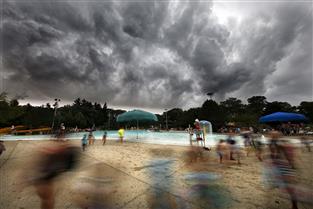Middle and high school students in Wauwatosa are experiencing their first weeks of the district's new grading system, which seeks to align grades with student achievement, while striving to eliminate student behavior from the grade equation.
The new system is a "best practices" model pioneered by Tom Guskey, an educational psychologist at the University of Kentucky, whose research led him to challenge traditional practices in grading. That work challenges the use of "zeros" for missing or late assignments, creates new definitions of homework and extra credit, contends that rigid mathematical precision in grading is not fairer or less subjective, and emphasizes the importance of offering multiple opportunities for learning and assessment.
Guskey, who spoke to Wauwatosa teachers a year ago, believes grading and reporting are not essential to learning, and he has found that grades have some value as rewards, but no value as punishments.
The new system in Wauwatosa reinforces a "changed emphasis from what we teach to what students learn," Superintendent Phil Ertl said at last week's meeting of the School Board.
Elizabeth Erenberger, the district's director of student learning, said the plan has many benefits.
"We're seeking consistency across grade levels and departments," said Erenberger. While many teachers, especially elementary school teachers, have been using best practices, not everybody was doing it.
"We have teachers talking about how they grade," Erenberger said - a tangible benefit already.
A teacher
Mary Davidson, a veteran English teacher at Wauwatosa East, said that much about the new grading system is not new. In the English department, teachers have been collaborating on methods, grading practices and assessments for some time. And, "based upon open houses, parents have been very receptive" to the system, she said.
"The idea is that students should be able to succeed," she said. And holding students accountable is part of that. "There's certain things we absolutely want them to do" - to be able to write a sentence, to write a multiparagraph essay, and other things that will serve them well in life.
Davidson acknowledges the division between behavior and knowledge, but sees the importance of "learning habits that allow learning to go on," she said. "We're not grading behavior, but some behaviors are what go on and make the student successful."
A student
Hannah Dion-Kirschner, a junior at Wauwatosa East, said she and other students see a conflict between the new grading system and the prized privilege that allows good high school students, based on grades and attendance, to seek en exemption from final exams.
The number of exam exemptions, which is set by the high school principals, have dropped from two per semester for juniors and seniors, to one per semester for all four high school grades.
"We feel that the policies contradict each other because the grading policy has been changed so that grades reflect only knowledge and not behavior. The changes affect things like homework, which can't receive a late grade anymore: grading emphasis is on whether the material is known and not on the process through which it is learned. While we find this fair, we think that exams become less necessary, not more, when the final grade reflects only knowledge, yet opportunities for exemptions have been decreased over the last two years," she wrote in an email.
Tosa East Principal Nick Hughes said exam exemption may be reduced further.
"If we give you a test or homework, we want you to do it because we think it is important," he said.
Also, tests are not only for the benefit of students, he said. By removing generally good students from the pool of test-takers, teachers get a less accurate picture of the effectiveness of their teaching and the test itself.
"The student makes a valid point about the value of a comprehensive final exam vs. learning mastery being cumulative throughout the semester," Ertl said in an email.
A good exam matched with a student who has mastered the material shouldn't make for a stressful experience, he said.
"I applaud the students for their analysis of their learning activities and would just clarify that they may not be in conflict if both the learning and the assessment are done with integrity," Ertl said.
More from News and Features
- Anodyne Coffee plans to open location in Wauwatosa Village
- Wauwatosa Meetings: Aug. 4
- Video: Wauwatosa girl's curbside ice cream stand raises money for the hungry
- Wauwatosa News and Notes: Hands-only CPR training offered; Firefly Art Fair is Aug. 6-7
- Wauwatosa Ask Now: Why are there barriers and fencing along the North Avenue bridges over the Menomonee River?
- Mystery Photo Contest: July 28
- Wauwatosa gears up for National Night Out event, this year at the zoo
- Election 2016: Wisconsin's 4th District candidates weigh in
- Wauwatosa's Luther Manor residents share smiles through flower delivery
- Wauwatosa Police Report: July 17-23














